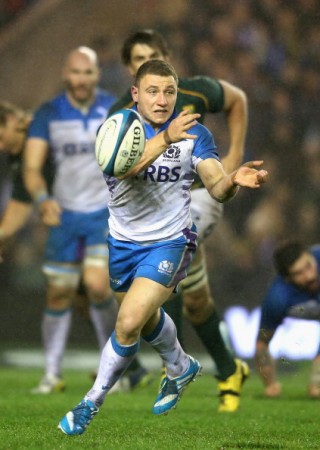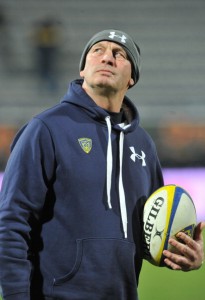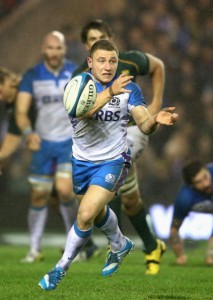
His cup of tea: Scott Johnson has certainly made himself comfortable in Scotland and has big moves ahead of him
By Alan Dymock
YOU COULD look at these Six Nations from a Scottish perspective and adopt a negative or a positive tone. However, pessimist or optimist, you have to admit that there is a rather exciting ‘no-lose’ element to it all for Scotland’s short-term head coach Scott Johnson.
Last year, when flung into the Six Nations in the wake of Andy Robinson’s departure the November before, he and his squad played on the hoof, pulled off two wins and finished third in the Championship. Whatever you have heard about Johnson, that is the environment he seems to thrive in. Just enough time to drop some memorable one-liners, letting a squad know it’s his vision or nothing else and encouraging others to be relaxed and expressive he can be your chum and your master for a while.
But as he has already moved upstairs and in the summer Vern Cotter will come in from Clermont Auvergne and take the reigns of the national team, he has a tournament in front of him and his backroom team of Duncan Hodge, Jonathan Humphreys, scrum coach Massimo Cuttitta and defensive expert Matt Taylor where they can gamble if they want. They have to want to, though.
When Johnson becomes director of rugby and nothing else, he can focus on important issues for the whole of Scotland like the structure (and frequently proposed restructuring) of amateur leagues and how coaches at every level are functioning. He can focus on every aspect of the fine tapestry that makes up rugby in Scotland. For now he is in camp with the elite and he has to look at results.
Cotter will get a brief and will have his own views. Super. There must be fewer great thrills for an ambitious international coach than to be given a project for the World Cup. But as Johnson has blooded so many new caps and picked a team to face Ireland at the start of the Six Nations with players like Ryan Wilson at blindside, David Denton at No 8, Duncan Weir at fly-half, Duncan Taylor at inside centre and with Richie Gray, Johnnie Beattie and Matt Scott on the bench, it looks like he has now settled his own views.
He appears to want obtrusive structure at the start of matches, and the ability to take risks, play on the run and try to get scores at the death. A bold move and certainly an inversion of the ‘typical’ Scottish style with rough-house hounding all game long and the belief that determination and structure will mean they can hold on to a game.
Perhaps this is the way the Johnson regime will play for well beyond the World Cup. Let’s see how it goes. Either way, Johnson will be out of the immediate firing line this time next year and will have been since Scotland’s landmark three-continent tour this summer.
If this approach suits Scotland and their younger players – and looking at names like Stuart Hogg, Sean Maitland, Scott, Weir, Beattie, Denton, Ryan Grant, the Gray brothers and Pat MacArthur it’s hard not to adopt a little sunshine-y hope – it could spell for a startling few years. Which everyone must want, rather than more of the same, eh?








